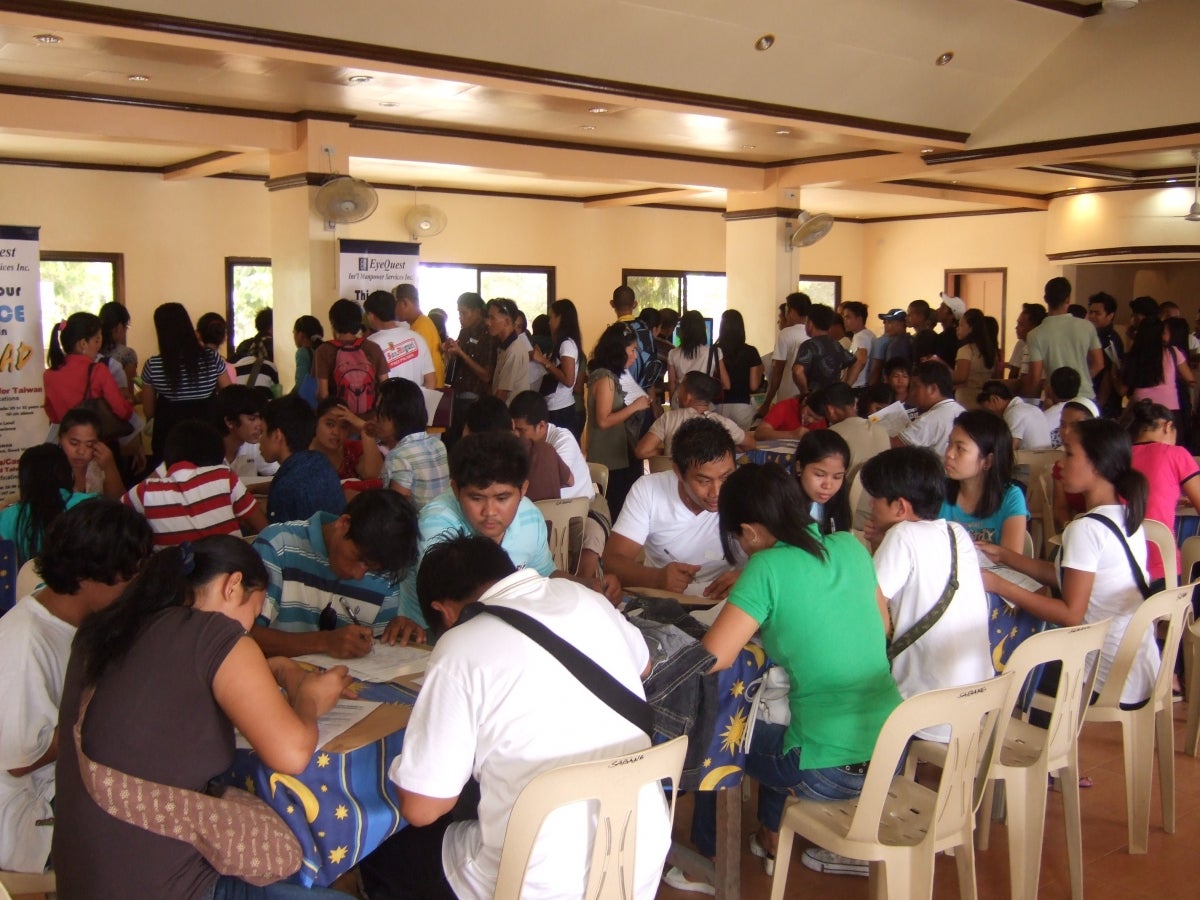This is the second in our series of posts by graduate students on the job market this year.
My job-market paper uses evidence from a field experiment in the Philippines to examine the role of incomplete information in job search, finding that a modest increase in individuals’ job-search experience has persistent impacts on individuals’ search decisions and employment outcomes. Expanding jobseekers’ access to information is an important way by which governments promote employment in both developed and developing countries, which we can see from the range of active labor market programs that target information gaps, such as aggregation of labor market information, job-search assistance, or training in how to search for work (Betcherman, Olivas, and Dar 2004).

Job Fair Participants
A broad theoretical literature examines the potential role of incomplete information on search effort (Burdett and Vishwanath 1988, Gonzalez and Shi 2010). However, we don’t know much empirically about the degree to which individuals actually lack information about their job prospects, nor about how individuals learn about the returns to search. What evidence there is suggests that information is likely to be important (Falk, Huffman, and Sunde 2006; Böheim, Hovarth, and Winter-Ebmer 2011).
To address this gap, I measure the impact of exogenous variation in individuals’ information sets and job-search experience on their search decisions and employment outcomes. I interview 862 relatively young (ages 20-35) men and women who I randomly select from the municipality of Bulan in Sorsogon Province. Individuals from randomly selected neighborhoods receive information about average wages or about minimum qualifications for the overseas labor market, for which there are high potential returns but limited search opportunities. Additionally, I randomly vary individuals’ job-search experience though an encouragement design to get people to attend a job fair held within the municipality.
I measure the impact of information on job-fair attendance by linking baseline survey data with administrative job-fair data collected during the fair. If information affects the relative returns to search across different labor markets, or if individuals gain skills and knowledge that are broadly applicable, search experience may affect individuals’ decisions to look for work domestically as well as abroad. I conduct a follow-up survey ten months after the job fair to measure the impact of job-fair attendance on the intensity and direction of individuals’ search effort, as well as on their employment outcomes.
Findings:
· Inducing job-fair attendance does not lead to migration, but it does change where people search for work and where they are employed
Voucher assignment nearly triples job-fair attendance rates, increasing attendance by 35.4 percentage points compared with a mean attendance rate of 12.7 percent among the control group. Assignment does not affect steps to migrate abroad after the fair.
Using a retrospective panel of job-search behavior, I find that voucher assignment more than doubles the likelihood of looking for work in Manila, where job opportunities are more plentiful and wages are higher, in the two months following the job fair. Individuals are 2.1 percentage points more likely to look for work in Manila, compared with a mean rate of 1.6 percent among the control group. In turn, individuals are less likely to look for work within the province.
It is also worth noting that it is those with less labor market exposure who appear to benefit the most from job-fair attendance, as the search impacts are concentrated entirely among the 58 percent of my sample with no experience interviewing or submitting an application for a job.
Additionally, voucher assignment increases formal sector employment by 38 percent, which comes primarily from individuals from shifting out of self-employment and into formal sector work. This effect may be driven by the change in where individuals search and/or by an increase in search effectiveness.
· Direct information provision doesn’t affect individuals’ decisions to look for work overseas:
Factual information affects individuals’ beliefs but not their decisions to look for work. I do not find evidence that average wage information or minimum qualification information affects job-fair attendance rates or steps to find work overseas. However, individuals do update their beliefs in predictable ways. Wage information increases the level of wages that individuals report they could earn overseas. Individuals are fairly accurate about the minimum educational requirements for common overseas positions, but they tend to underestimate the minimum experience requirements, and information about qualifications reduces these errors.
Furthermore, very few individuals – 1.6 percent – look for work overseas in the months after the job fair. Taken together, these results suggest that other barriers to migration like credit constraints, bureaucratic barriers, and risk aversion may be more important in explaining why more rural Filipinos are not looking for work overseas.
Limitations
This paper indicates that a relatively modest intervention to improve potential job seekers’ labor market exposure – a job-fair attendance subsidy – can have persistent impacts on labor market outcomes. However, the mechanisms are less clear. What is it about attendance that matters? Do attendees learn more about domestic labor market opportunities, or do they gain additional confidence or job-search skills that benefit them in the local labor market? Because I do not measure beliefs and labor market perceptions immediately after the fair, and because the type and intensity of information individuals receive at the fair is likely correlated with unobserved characteristics, I leave exploring the specific channels through which job-search experience affects outcomes to future work.
Contributions
This paper highlights the empirical importance of incomplete information in search decisions, while finding that poor information about wages and minimum qualifications for overseas work do not seem to preventing search abroad. For policy makers, it indicates that increasing labor-market exposure may have persistent effects. Furthermore, it suggests there is substantial scope, particularly for individuals who have never looked for work before, to learn experientially about the labor market and to adjust their search behavior accordingly.
Emily Beam is a job-market candidate in Public Policy and Economics at the Gerald R. Ford School of Public Policy and Department of Economics, University of Michigan


Join the Conversation